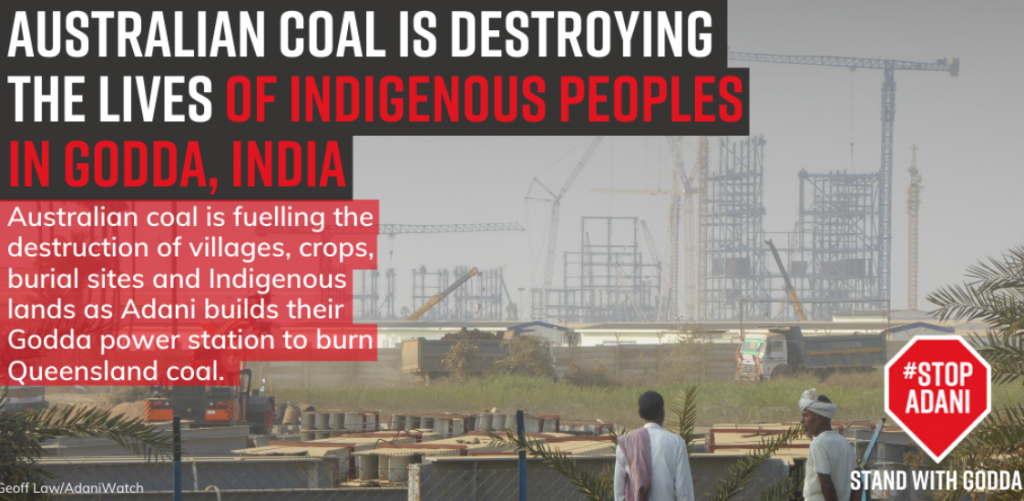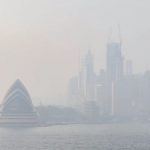Shocking new footage reveals local people resisting Adani’s Godda power station have had their land stolen, their crops destroyed, and been beaten by police. They are still resisting Adani’s coal plans despite this oppression and intimidation. They have started a petition on Avaaz against Adani’s coal plans and are calling on people around the world to support them.
In India, just as in Australia, Adani’s destructive coal plans are violating Indigenous land rights, destroying precious water and the local environment and putting threatened species at risk. Adani’s Godda coal plant will drain 36 billion litres of water every year from the sacred Ganges River – potentially putting threatened species such the Gangetic dolphin at risk, as well as crucial fish stocks. Adani have already started sucking up huge amounts of water from the surrounding villages in Godda with local farmers reporting their wells are running dry and their crops are failing.
General Electric (GE) are helping to fuel this damage to local communities, environment and climate by supplying critical equipment for Adani’s power plant. Tell GE to stop helping Adani and get out of coal!

What is Adani’s Godda power station?
Godda is in eastern India, in Jharkhand state, close to the border with Bangladesh. Adani’s proposed 1.6GW power station in Godda requires an estimated 5 to 6 million tonnes of coal from Adani’s Carmichael mine in Australia each year.
Despite being located in a coal-mining region, 700km away from ports, and India’s policy of phasing out imported coal, Adani’s proposed Godda power station will rely entirely on imported coal. Transporting coal over such large distances will raise the cost of producing electricity at Godda, which Adani plan to pass on to consumers thanks to a controversial deal with the Bangladeshi government and special concessions from the Indian government.
How is Adani’s Godda power station progressing?
On July 2015, a joint declaration was signed by Bangladesh and India during Indian Prime Minister Narendra Modi’s visit to Bangladesh. Following this declaration, Adani Power Limited executed a Memorandum of Understanding (MoU) with the Bangladesh government to develop Adani’s Godda power station and supply all of the power generated to Bangladesh on very favourable terms for Adani.
The project received environmental approval in 2017, but there had been little progress on construction until Chinese company Sepco Three began construction on the Godda power station in September 2019. Speco Three are also providing equity financing. General Electric will provide two 800MW steam turbine generators which will be jointly supplied by GE’s ABP factory in Beijing and its Sanand factory in Gujarat. Adani want the power station to be operational from 2022, roughly coinciding with its planned export of coal from Adani’s Carmichael mine in Australia.
Adani has received an environmental clearance (EC) to build a 100km pipeline to extract water from the Ganges River to use in Adani’s Godda power station. This approval is being challenged in court.
What’s wrong with Adani’s Godda power station?
Adani is brutally dispossessing indigenous people from their lands, destroying farmers’ livelihoods and abusing human rights for its Godda coal power station. Adani requires 1,214 acres of land across 10 villages for its Godda coal-fired power station. Much of the land is fertile farmland and home to thousands of people. Three of the villages are predominantly Santhal, an Indigenous adivasi community for whom the land is sacred.
According to a report from the Jharkhand Jan Aadhikar Mahasabha (JJAM), by October 2018 Adani had acquired 500 acres of land from four villages – Mali, Gangta, Motia and Patwa. Over 40 families have been affected by this land acquisition. Local villagers have started a legal challenge in the Jharkhand High Court to strike down Adani’s contentious acquisition of fertile farmlands, saying the entire acquisition process had been “marked by illegalities and irregularities” and was forced through with “coercion, fraud and undue influence.”
Villagers resisting the hand over of their land have been forcibly kept out of public hearings on the project, and their land has been fenced off by Adani without their consent. When Adani’s earthmovers moved in they were accompanied by police as Adani uprooted coconut palms and removed paddy fields and a mango orchard. This disturbing video shows local women begging an Adani official not to destroy their land.

Residents that have protested the land acquisition have suffered brutal repression and even violence. In 2017 there was a public hearing on the project in which impacted villagers opposed to the project were refused entry. When they protested a huge group of police “broke into a lathicharge (charged with batons), fired teargas shells and even entered the homes of villagers, beating some up, according to several residents of Motiya and Ranganiya villages.” In another horrific incident a retired teacher named Ram Jeevan Paswan found Adani excavating his land. “When he protested and asked who had authorised this, he was allegedly threatened by the machine operators. “Then Adani’s man came,” said Paswan. “I asked him the same thing. First, he pushed me, and I fell. Then he hit me with his shoes and insulted me and said ‘dusadh saala, we will bury you into this ground.’” Dusadh is another term used for the Dalit Paswan community.
Local people, such as prominent politician and community leader Pradeep Yadav, have been jailed for opposing Adani. Local politician Nishikant Dubey said after a community meeting in September 2019, “The troublemakers are in jail and others who tries to block development of Godda will also be behind bars.”
The way Adani and the state colluded to acquire land in Godda is symptomatic of a broader pattern of violation of Indigenous Adivasi people’s land rights in resource-rich states in India — whereby the government forcefully acquires lands of Indigenous people without consent stating a purported “public purpose” when there is none. The extent of human rights and Indigenous adivasi rights violations in areas “scheduled” as special areas protected under the Constitution can be seen through the violation of laws during land acquisition by the state government.

Public money and political favours from India, Bangladesh and Australia are propping up Adani’s polluting coal plant
The former Jharkhand state government helped Adani forcibly acquire land from villagers for the power station by declaring the project was for ‘public purpose’. The villagers are seeking to contest this declaration in court, arguing that there is no ‘public purpose’ as all the energy will go to Bangladesh and is for private profit of the Adani group. “The people who live near the site would receive none of the electricity, just the pollution.”
The Modi Government gave Adani’s Godda power station the status of a Special Economic Zone (SEZ) just before India’s 2018 national elections. It is India’s first power SEZ, geared to fully export electricity. This was only possible due to a change made by the Indian government to existing regulations, and it makes Adani exempt from several levies, including on rail access and imported coal and equipment. Among other benefits, the decision will save the Adani group from contributing 3.2 billion Indian rupees ($AU 66 million) to finance and promote clean energy initiatives.
The project has also been approved for a roughly $US700 million loan from the Power Finance Company (PFC), an Indian state-owned lender that funds power stations; and for another $US700 million loan from the Rural Electrification Corporation (REC), a state-owned company designed to help electrify Indian villages. These are huge contributions from Indian taxpayers even though electricity from Adani’s Godda power station won’t be used to power a single Indian home.
In December 2019 there was a state election in Jharkhand in which Prime Minister Modi’s BJP suffered a stunning defeat to an alliance of the JMM and Congress Party. This is significant as the Congress Party had promised to cancel Adani’s power plant if they came to power and the JMM had promised to “review” the Adani project. The BJP has been further isolated in Jharkhand by all regional parties extending unconditional support to the JMM-Congress alliance.
Adani’s coal power from Godda will deepen poverty in Bangladesh and India, not alleviate it
Adani and its supporters sometimes claim Adani’s coal will help alleviate energy poverty in India. Adani’s Godda coal plant won’t provide electricity to a single person in India, it will dispossess many locals of their land and homes.
The Power Purchase Agreement (PPA) Adani signed with the Bangladeshi Government allows Adani to push the high costs of importing and transporting coal on to some of the world’s poorest people in Bangladesh. Godda would lock Bangladesh into expensive electricity with high emissions at a time when cleaner, cheaper renewable energy is rapidly being deployed across India.

Adani’s Godda station will wreck water and take 36 billion litres a year from the Ganges River
Adani plan to construct a 100km water pipeline to extract 36 billion litres of water from the Ganges River — India’s most famous river and a sacred site for Hindus. In the Godda coal plant, Adani will use water from the Ganges River to wash coal; cool the steam used to make electricity in the power plant; and to control pollution from the plant.
Adani’s initial project approvals were to extract water for its Godda power station from the much smaller Chir River. But Adani made a last-minute change to the water source to the Ganges River, in a move regarded as controversial and underhanded.
Locals around Godda say the water table has fallen dramatically since Adani started sucking up massive amounts of underground water to construct the power plant. Farmers are unable to grow crops and the wells are running dry.
Adani’s water intake from the Ganges risks endangered species and important fish stocks
The Ganges is home to critically endangered wildlife such as the Gangetic dolphin and gharial crocodile, and hilsa shad — a vital fish stock that’s already under pressure and which 5 million people rely on for their livelihoods. Adani have failed to collect any baseline data on populations of fish, shellfish, birds, turtles, gharial crocodiles and Ganges river dolphins in the area where their pipeline for the Godda coal plant will drain water. Adani have failed to consider the potentially significant impacts on aquatic species from the construction and operation of the pipeline, including potential entrapment and impingement of animals, and the impacts of dredging, dredge disposal and noise pollution.











